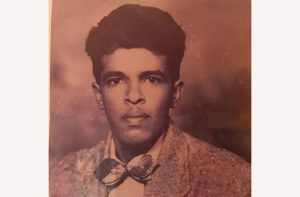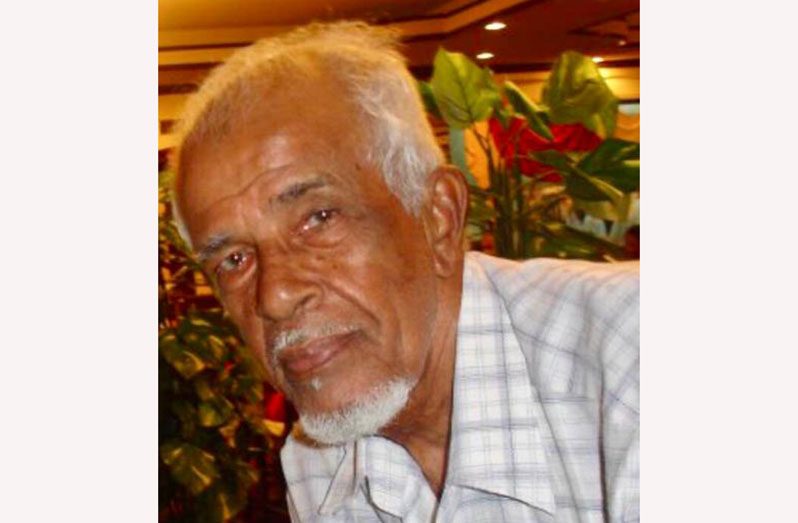— Shamsudin Mohamed Rahim: an account by his daughter
NOBLE deeds often go unheard of, as they are often done with clean intentions and a heart of compassion. But sometimes, the contributions of a person are so magnanimous that they have to be shared with others, even if that person has left this world.
“My dad was this awesome human being; a kind, caring and honest individual. He was a great listener, a great communicator, a peacemaker, a giver, a home mender, an adviser, and an advocate for women’s rights.” These were the words of Zenefia “Bibi” Rahim, daughter of Shamsudin Rahim, as she fondly recalled memories of her late father.
Shamsudin was born on January 5, 1931, to Abdool and Neeajan Rahim, at Better Hope, Essequibo Coast. His parents were indentured labourers on the Hampton Court estate.
“He was the fifth of nine children and came from humble beginnings. He told us stories of the war and the ration book, and why the ration book? Germany wanted to weaken the British, so Germany stopped all food and supply ships that came to the British colonies; so the ration books came into being to regulate the food distribution,” Bibi recounted.
Her great-grandparents, Rahim’s grandparents, did not return to India, but made Guyana their homeland early in the 19th century. According to Bibi, it was her great-grandfather that bought the Better Hope estate, where the Durguhee family settled. The estate was then divided among Rahim’s mother and her siblings.
 Shamsudin’s father passed away in 1950, while the former was 19 years old. Bibi recollects stories that her father told of his childhood, including a select few that she recalls distinctly.
Shamsudin’s father passed away in 1950, while the former was 19 years old. Bibi recollects stories that her father told of his childhood, including a select few that she recalls distinctly.
“He used to leave home at 2:00am on a donkey cart to go to Anna Regina and Hampton Court markets to sell fish with his dad and by 6:00am to 8:00am, they were finished selling and headed back home. What I vividly remember was his story of the donkey, Willie, stopping and making a hissing sound when he sees a ‘jumbie.’ My grandfather would say, ‘go on boy! You only frighten the living, not the dead!’ and pull the reins to continue on his journey,” the woman related. Further, she said: “Later, his dad bought another donkey named Rocket. There were so many other stories that he and Clifford ‘Uncle Six’ Bollers, who was one of his old friends from Dartmouth village, would talk about when Uncle Six visits us at weekends.”
Her father had started school at Dartmouth in 1935, where he received his primary education. All his siblings attended the school, and Shamsudin completed his education at 14 years of age. As he grew older, he and his brother Kadir began investing in vegetable and animal farming. In 1956, Shamsudin and his brothers Haniff and Kadir, built a 48-foot cargo boat to transport produce from Essequibo to Georgetown, bringing stocks from Georgetown to Essequibo on return. Shamsudin was in charge of financial management of the business, while Haniff served as the captain, and Kadir as the sailor.
A BETTER LIFE
The boat was given the name ‘Starlight’, a nickname of Rahim’s father, Abdool. Afterwards, a second, bigger boat was built, and life became financially brighter for the brothers. Their social lives, however, became overdone, according to Bibi, and the brothers lost focus. Their trade went under in 1962.
Later, Shamsudin went on to work with his brother, Yasim Baksh, who was a jeweller, to learn his trade. Years later, Rahim became an entrepreneur in Guyana’s jewellery trade, where he remained until his retirement at 79. In 1956, when Shamsudin was 25, his marriage was arranged by his brother and he married on December 9 of that year. He continued to reside with his mother after marriage. The man and his wife had 10 children, although their second-born, Shairoon, died at six months of age, from what was suspected to be typhoid.
“During this time dad thought that his family was getting bigger, so he bought a piece of land in Dartmouth village. This village had only one coloured family. We were the second, and we moved in 1960, where five of his children were born: Vonya, Haffiz, Fazlo, Kamal and Rhyan. We were just a two-minute walk from the now 8th of May school and Amantado shop, and a minute to the post office,” Bibi recounted. These, she said, though, are no longer there.
During the distubances in the 60s, Shamsudin was a member of the security group that kept ‘troublemakers’ out of Essequibo, which was without any problems during that time. He was also a member of the Dartmouth School Education Board, then later, Treasurer of the Infant and Welfare Committee. He was also a member of the village council, which later became the Neighbourhood Democratic Council, where he served as Chairman. Due to health issues, he resigned at age 83.
“He was a leader, a listener, a communicator…. he had so many sides of him that made him the unique being that he was; very active in the schools — be it private or public, hospitals, religious houses regardless of religion and beliefs, the communities at large, he was always ready to give; be it materials or monetary, simple or technical advice. Dad always said, ‘the more you give, you will feel good inside, and you will help others to feel happy, and help them to have a better lives’,” Bibi said.
BRINGING FAMILIES TOGETHER
Since he worked in the communities and his trade took him into homes, Shamsudin was able to diffuse family issues and mend and bring families together. He taught his children that family comes first, and reiterated the importance of surrounding yourself with good company, quoting: “Your family is chosen for you, you only get to choose your friends.”
Though his family went through many hardships after moving, they all emerged successfully, according to Bibi, who stated that all of Rahim’s children were married and have children of their own. She recalled her father having strong beliefs and principles, which he instilled in his children time after time.
“One of his strong beliefs was that when a couple gets married, the woman must walk or sit on the right side of the man, not on the left side. His explanation is because she is his life partner, meaning she is his right hand person,” Bibi shared.
Shamsudin was a person who wanted his children and grandchildren to know their roots. He went to the archives in Georgetown and got information of the ship that his parents came on as children with their parents. He made sure he kept copies of birth, marriage, death, land transport, business transactions, his appointment letters for the board of education, and even a picture of the British “ration book.” “He touched many lives with his trade, and his jewellery, which I have seen passed down five generations already. At functions or “gaffs,” he would always leave with a riddle or a history question to follow up, little stories or events, or advice that persons would remember him by, and relationships that he helped mend. All of this made his purpose on earth very appreciative,” Bibi concluded. Shamsudin lived a “full life,” according to his daughter, and departed his earthly life on the July 2, 2019.



.jpg)








